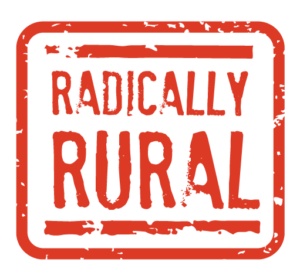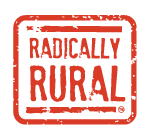 Radically Rural is coming to Keene. The inaugural two-day Summit is expected to attract 500 people from the Monadnock Region, New England, and throughout the Northeast, who are passionate about creating vibrant, robust rural communities and eager to learn, connect, and lead change.
Radically Rural is coming to Keene. The inaugural two-day Summit is expected to attract 500 people from the Monadnock Region, New England, and throughout the Northeast, who are passionate about creating vibrant, robust rural communities and eager to learn, connect, and lead change.
The Hannah Grimes Center for Entrepreneurship and The Keene Sentinel are partnering to present Radically Rural, which will provide a uniquely rural point-of-view for community-building, entrepreneurship, and economic development. The Summit is scheduled for September 27 and 28, 2018.
Mary Ann Kristiansen, executive director at Hannah Grimes said, “Broad shifts in demographics, technology, and values are creating opportunity for innovative thinkers, entrepreneurs and community-builders who love their rural communities and know their advantages.”
Kristiansen said recent studies indicate that people are increasingly interested in living in rural areas and that technology advances make living and working in rural areas easier than ever. “Radically Rural will spotlight and share new ideas, and what’s being done.”
Terrence Williams, president and COO at The Keene Sentinel said, “Radically Rural will feature five high-energy program tracks that offer strategic opportunities for transformation in rural communities, as well as our very popular CONNECT event Thursday night.”
The program tracks include Entrepreneurship, Arts and Culture, Journalism, Main Street, and Working Lands. “Rural communities have distinct challenges and opportunities that are not adequately addressed by conventional economic development conferences,” said Williams. “Radically Rural will focus on innovative approaches specifically designed for rural communities.”
The Summit will be held throughout Keene, transforming Keene’s beautiful downtown into a “conference center.” Attendees will pass coffee houses, restaurants, shops, and meeting places to find Summit venues at The Colonial Theatre, MoCo Arts, Citizens Hall, the Keene Historical Society, Keene State College, and the Hannah Grimes Center for Entrepreneurship. Radically Rural will also feature local food, and regional artists, musicians, and performers.
On the first evening of Radically Rural, the 12th annual CONNECT event will be held. CONNECT is an annual gathering of more than 400 locally-focused citizens and community leaders. According to Williams, “CONNECT is all about the value and importance of rural communities. CONNECT spotlights the advantages and opportunities of rural living, and showcases the Monadnock Region’s local businesses, food, art, and entertainment.”
In addition, the Hannah Grimes Center for Entrepreneurship has launched The PitchFork Challenge, a business pitch competition that will award the winning business a $10,000 cash prize. The PitchFork Challenge is now accepting applications, and will conclude with final presentations this September, as part of the Radically Rural’s entrepreneurship program track.
“We are excited to present the PitchFork Challenge, award the winner a substantial $10,000 cash prize, and incorporate the Challenge in our first Radically Rural Summit,” said Kristiansen. Details can be found on Hannah Grimes’ website, at hannahgrimes.com/pitchforkchallenge. Applications to participate are due July 31, 2018.
To learn more about Radically Rural and to register to attend, visit RadicallyRural.org.
RADICALLY RURAL PROGRAM TRACKS
Five dynamic, interactive program tracks will feature topics critical to building healthy, vigorous rural communities.
Arts and Culture
The arts and culture bring creativity, energy, and positive civic engagement to rural communities. They are also surprisingly robust economic development engines in rural areas. How do artists and arts-based organizations not only survive, but thrive as sustainable businesses in rural communities? How do they give back to their communities? Explore how artists can develop their business models, their markets, and in turn, become advocates and catalysts for their rural communities.
Local Organizer: Monadnock Arts Alive!
Entrepreneurship
Entrepreneurship has a powerful impact on creating regional prosperity through new job creation. Over the past decades, we have seen a growing disparity between rural and urban entrepreneurial activity and a corresponding growth in economic, social and political differences between the two. Different types of businesses call for different ecosystems – and creative solutions for financing, mentorship, networking and other resources are bubbling up in rural communities across the nation to meet the challenge.
Local Organizer: The Hannah Grimes Center for Entrepreneurship
Journalism
Small town journalism is in the crosshairs. Consolidation of newspaper companies, the closing of newspapers, reduction in journalism jobs have conspired in some cases to create news deserts. What happens to small communities when the news they have relied upon for decades erodes or disappears? What can be done to preserve local journalism and news coverage? How do readers protect themselves against fake news? What happens to trust? What goes into coverage of small towns? We have solutions.
Local Organizer: The Keene Sentinel
Main Street
It’s an idea as much as it is a location… Throughout rural America, Main Streets represent small businesses, friendly neighbors, quality, handcrafted goods, and unmatched customer service. Main Street is a feeling of timelessness and community. Having faced countless challenges, including the rise of chain stores, job losses, and more recently, the e-commerce boom, Main Streets have suffered. How are we going to combat the fight against convenience? Can a rural town and its surrounding community survive without a thriving Main Street? Main Street is not a thing of the past, but what do we want it to be in the future? Think radically.
Local Organizer: The Hannah Grimes Center for Entrepreneurship
Working Lands
Connectivity to the rural landscape, sustainable agriculture, and creative stewardship of natural resources are critical for rural communities. Working Lands will explore radical new approaches to building the local food scene, applying conservation psychology to connect people to the land, and creating long-term sustainability for local food sources.
Local Organizer: The Cheshire County Conservation District
